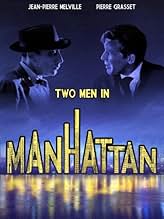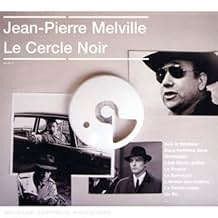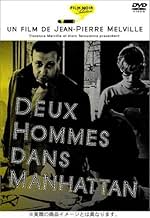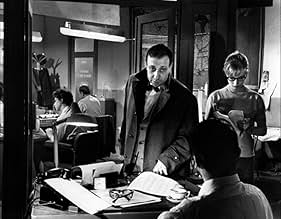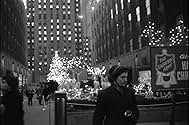Deux hommes dans Manhattan
- 1959
- Tous publics
- 1h 24m
A French UN delegate has disappeared into thin air, sending reporter Moreau and hard drinking photographer Delmas on an assignment to find him. Their only lead is a picture of three women.A French UN delegate has disappeared into thin air, sending reporter Moreau and hard drinking photographer Delmas on an assignment to find him. Their only lead is a picture of three women.A French UN delegate has disappeared into thin air, sending reporter Moreau and hard drinking photographer Delmas on an assignment to find him. Their only lead is a picture of three women.
- Director
- Writer
- Stars
- Bessie Reed
- (as Michele Bailly)
- Director
- Writer
- All cast & crew
- Production, box office & more at IMDbPro
Featured reviews
Said to be a combination of American film noir and the budding French New Wave movement, Two Men in Manhattan very neatly utilizes the good sides of both styles. The urban street views and skyscrapers look excellent in the glow of the bright ad signs on store marquees and the dark, stark lighting set up for interior scenes is a joy to the eye too. The laid-back jazz soundtrack is highly enjoyable, creating a mood softer than in hard boiled detective noirs, even though the seedy locations would fit in such flicks seamlessly as well.
A lot of the film's charm lies on the shoulders of the two protagonists, who suit their roles splendidly. Melville's sad-looking appearance matches his character's melancholic but righteous attitude perfectly, while Grasset makes a great pairing for him as the greedy and amoral Delmas, prone to drinking and sleeping around. Ultimately their opposing approaches to the ethics of journalism are what create one of the main themes of the film; namely, examining the responsibility of the press when publishing stories of delicate nature. Besides the lead duo, the supporting actors do a good job too, from a suicidal stage actress Judith Nelson (Ginger Hall) to a jaded cabaret dancer Bessie Reed (Michèlle Bailly) and a jazz singer Virginia Graham (Glenda Leigh) who we get to see recording a haunting song in a studio.
All in all, when a film successfully combines a totally smooth and cool atmosphere with suspense and humour like Two Men in Manhattan does, it just cannot be anything but highly enjoyable. The movie is simply thoroughly entertaining, but since the technical elements are also very skilfully created, there is no reason to skip this one if you're even remotely interested in film noir and French cinema.
If you are looking for a noir with verve and great music, why not try Ascenseur pour l'echafaud, with REAL actors and Miles Davis's great score.
When the story arrives, it's revealed to be an ethical dilemma: our two principals (Melville as an Agence France Presse journalist and Pierre Grasset as his photographer buddy) discover a French diplomat and ex-Resistance hero dead of a heart attack in an actress's apartment. Do they report the truth, cover it up to preserve the guy's reputation or sensationalise it even more to make a fortune from the exclusive?
Melville was by no means a great actor, but his baleful eyes, bland smile and spiffy bow tie in this film give him a kind of sleazy charm that brings to mind Peter Lorre. His character's name (Moreau) is a pun on "moraux", which means moral, and indeed he is intended to be the moral centre of the film. There are moments, though, when he seems genuinely sinister: when he peeps on a bare-breasted dancer in her dressing room (the scene was censored in the UK), and when he looms threateningly over another girl who has just attempted suicide.
"Deux hommes..." is the most New Wave of all Melville's films. The raw, documentary-style shots, the improvised feel to some of the scenes (Melville makes frequent mistakes when speaking English), the use of real locations and untrained actors (including Melville himself), were jarring to audiences and critics at the time. In the light of Godard and Truffaut we can now better appreciate the type of film-making that Melville helped to inaugurate. Nevertheless, Melville regarded "Deux hommes..." as a failed experiment, returning in his subsequent films to a more classical approach.
Finally, about a quarter hour in, Melville goes to the apartment of his cameraman, Pierre Grasset, and the wallpaper outside his apartment was poorly hung. Aha! I thought, a creature of the demi-monde, someone who cuts corners, was looking out for himself, who had pictures of the young women that the diplomat.... associated with. Off they went into the night, still followed by a mysterious trailer: Melville, the moral reporter, and Grasset, the corrupt guide. I knew they would find their prey; but how moral would Melville be and how corrupt Grasset? And who was following them and why? Who was the hero of this story and exactly what was the Great White Whale they were following?
This movie is Melville's own personal fantasy, set in a fantasy New York glamorous beyond belief to anyone who has dwelt in the real one. He had been born Jean-Pierre Grumbach, and had adopted a new surname in admiration of Herman Melville. He had played Bartleby and written and directed his own movies and now was going on his own voyage to find out if he could be the hero of his own tale.
A French UN delegate goes missing in New York City, and a French reporter (played by Melville himself) and his photographer friend go on the hunt by tracking down three women, one of whom is suspected to be his mistress.
I love a good mystery, especially one shot on location in late-50's New York, and the "over the course of a single night" conceit can be delightful. But the characters initially read flat, and the stakes feel nonexistent until we get towards the end of the story. Once certain characters' true colors are revealed, it becomes a treatise on the moral responsibility of journalists and storytellers, and, Melville being Melville, French WWII resistance comes into play. It's not terribly nuanced, but it's an effective moral tale, revealing the same sort of deep humanism that underlies Army of Shadows.
Visually, it's a strange, inconsistent blend. Much feels amateurish, like a quickly-shot newsreel, which isn't inconsistent with the sorts of noir and noir-tinged 40's and 50's American urban films Melville is riffing on (The Naked City looms particularly large). But it doesn't feel quite in the wheelhouse a director whose use of meticulous, almost meditative cinematography is a distinct calling card.
That said, there are some incredible shots, including a slow tracking shot in a jazz studio, which is now near the top of my "scenes featuring musical performances where it's clear they're actually playing the music" list.
Overall, it's a less essential entry in the Jean-Pierre Melville catalog. But if you've watched the big ones, and want to see a great director directing himself in a good movie, check it out.
Did you know
- TriviaThe first credited acting part for director Jean-Pierre Melville.
- Quotes
The Singer: [sings] There's a street in Manhattan / With a house that has no windowpanes / And the lamp that burned all night / Listen man, go away from me / I lived there so long ago / With a guy you wouldn't care to know / God it's cold here / Nothing good here / Go man / Not tonight
- ConnectionsFeatured in Keeping Up Appearances (2013)
- How long is Two Men in Manhattan?Powered by Alexa
Details
- Release date
- Country of origin
- Languages
- Also known as
- 2 hommes dans Manhattan
- Filming locations
- New York City, New York, USA(Exterior)
- Production companies
- See more company credits at IMDbPro
Box office
- Gross worldwide
- $2,527
- Runtime
- 1h 24m(84 min)
- Color
- Sound mix
- Aspect ratio
- 1.37 : 1


